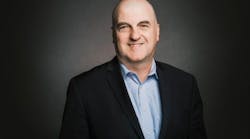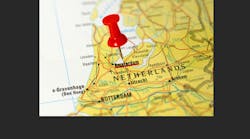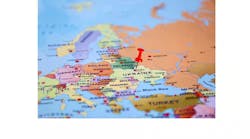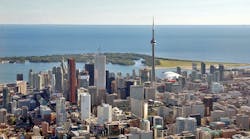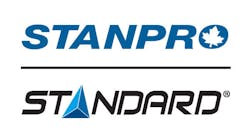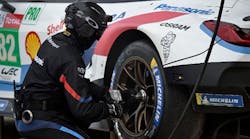Hagemeyer's acquisition activity was big news at European meeting of electrical wholesalers.
Just when you thought it was all about Rexel and Sonepar, along came Hagemeyer - acquiring distributors on both sides of the Atlantic. Certainly, acquisition activity was the topic of many conversations at the 45 superscript th General Assembly of the 14-nation European Union of Electrical Wholesalers (EUEW) held this summer in Chester, England. Delegates were also preoccupied by the unprecedented regulatory punitive action directed against Dutch national federation distributors by the European Commission (EC).
The Dutch national federation was fined 4.4 million EUROs (about $4 million) by the EC for the alleged infringement of European Union (EU) competition guidelines. The Dutch national federation's largest member, Technische Unie, in which Sonepar Distribution has a controlling interest, was also fined an additional 2.15 million EUROs. The entire delegation of the Dutch federation was conspicuously absent at the meeting.
Also absent from the meeting was Richard Rose, the member chairman of the host United Kingdom federation. Rose's firm, WF Electrical PLC, had entered into an agreement three days before the EUEW meeting to be acquired by the Netherlands-based international distribution holding company, Hagemeyer N.V.
The Hagemeyer acquisition of WF came as a distinct surprise - literally on the eve of the EUEW General Assembly. The acquisition will have a significant impact on the European buying group IDEE, whose highly selective membership is limited to only one leading independent electrical wholesaling company per country. The acquisition of WF, which had been the United Kingdom member of IDEE, leaves the buying group with little if any realistic prospect of finding a replacement in that marketplace.
Prior to the WF acquisition, Hagemeyer already owned the second largest distributorship in the United Kingdom - Newey & Eyre. Hagemeyer's combined enterprises now fill the No. 1 spot, with the United State's CED-owned Edmundson bumped from the top spot to No. 2, trailed by City Electrical Factors and Rexel-owned Senate Electrical Wholesalers.
The determination of Hagemeyer to make the WF acquisition was evident in its cash offer of about $8.24 per WF share, which was a 65% premium over the closing WF price on the London Stock Exchange the day before the offer was made. Ten days after this deal, the Netherlands powerhouse followed its earlier acquisition in the United States of Tristate Electrical & Electronic Supply Co., Hagerstown, Md., with a letter of intent to acquire Cameron & Barkley, Charleston, S.C. Since then, Hagemeyer agreed to acquire The Electrical Group (TEG), the largest electrical distributor in Australia, for approximately $200 million.
The Hagemeyer group, which has about $7 billion in overall sales, operates in more than 60 countries in Europe, North America and the Asia-Pacific regions; it has about 17,000 employees worldwide. Hagemeyer's other European interests include Froschl in Germany and Elektroscandia in Scandinavia, as well as a strong presence in the Netherlands, Austria and Poland.
Although the fast-moving Hagemeyer was at the forefront of conversations at the meeting, the fine that the Dutch Federation got hit with by the EC was also a big concern. The EUEW's chairman, Jose Menendez, stated that the amount of the EC penalty levied on the Dutch federation was excessive, and it had no realistic correlation with the value of the national market or the resources of the association. "The aim can only be to destroy it (the Dutch association)," he said.
To put the 4.4-million-EURO penalty in perspective, the annual revenues of the National Association of Electrical Distributors (NAED), St. Louis, Mo., are about $5.5 million. The Dutch federation represents only seven companies, and the entire Dutch electrical wholesaling market is valued at about $1.2 billion.
Due largely to this regulatory curtailment of industry activity, the Dutch federation reported a 10.23% decline in member sales volume for the past year. According to European industry sources, the EC ruling as it stands has effectively rendered the Dutch association inoperative.
The case stems from litigation initiated in 1991 by United Kingdom-based City Electrical Factors and its Dutch subsidiary CEF. According to the EC, there were two infringements: "operating a collective exclusive dealing arrangement," and "interference by an association in the pricing policy of its members."
Perhaps the most compelling and politically correct argument marshaled by the EC was that the Dutch federation members account for 96% of the electrical wholesale market in the Netherlands, and about 40% of all "electrotechnical" products sold on the Dutch market are imported - hence, trade among member EU states was allegedly restricted appreciably.
Despite distractions from the Hagemeyer acquisition and the EC fine, the pan-European organization of electrical wholesalers has good reason for guarded optimism, according to chairman Menendez.
"After many months of a favorable evolution of economic indicators, our market environment is now leaving a period of uncertainty and is regaining its full strength," he said. "Continuous growth of our markets and businesses across much of Europe is concrete proof that this trend is a matter of fact."
As evidence of this, EUEW sales volume for the past year increased 4.7% to $24.96 billion. Dr. Horst Beckers, executive director of the German electrical wholesaling federation, VEG, noted that the differences in overall economic growth among the European Economic Community has decreased, but in the first half of this year there was a general price increase in all European industries of about 2% due to the more than doubled price of oil. "Due to the intensifying conditions of competition within the EURO area, and also the greater transparency of prices, it is expected that price increases will be slowing down," he added.
With regard to the electrical distribution industry in particular, Beckers singled out labor costs as a differentiating factor among nations. For example, firms in France and the United Kingdom spend 40% of their gross margins on salaries, but in Germany and Austria that expense represents 60%.
Gross margins overall have been essentially consistent, the most significant increase being in Belgium, up to 25% from the previous year's 21%, followed by France, up to 26.5% from 24.3%.
Germany. Beckers reported the 90-year-old German federation is experiencing a respectable sales volume of some 10 billion EURO, the market dominated by national and international groups, five of which - Froschl, Rexel, Otra (part of Sonepar), i-center, and Wurth - account for 55% of total sales. Froschl, the largest with 1.2 billion EURO, is owned by Hagemeyer.
VEG members are troubled on two fronts. There is a growing use of the Internet to bypass other players in the traditional market system, and there is a noticeable increase of internal theft in the workplace. According to Beckers, manufacturers are using the Internet to sell direct, and at least one distributor has set up a business-to-consumer Web site with a selection of 100,000 products.
The latest estimate of in-house theft in the German electrical distribution industry is 125 million EURO annually. Accordingly, the national federation has appointed a task force to seek ways to lessen this loss.
Austria. Meanwhile, across the Alps in Austria, electrical distributors are experiencing some EURO-woes, says VEG executive director Martin Weigend. Typically, gross prices are 20% higher in Austria than in Germany, engendering cross-border buying of electrical materials.
In addition, construction activity has noticeably slackened, and "green" issues continue to be a problem. The disposal of various electrical/electronic products consumes a significant amount of member and federation time and finances.
France. According to Michel Nicolas, executive director of the French association, virtually all economic indicators are the strongest in years. There is an expected GDP growth rate of 3.5%, inflation is steady at 1.4%, and all indicators point to a plus-side trade balance of about 15 billion EURO. New housing projects have risen more than 12%, and the industrial sector is showing growth of some 5%.
But the most relevant development for French electrical distributors was the sizable government slash of VAT tariffs for maintenance and renovation materials - from 20.6% to 5.5%.
United Kingdom. Nigel Ellis, executive director of the Electrical Distributors Association in the United Kingdom, reported a high incidence of United States incursion into that marketplace. "American companies have been actively acquiring in the lighting and conduit sectors," Ellis said. "Cooper Industries has acquired British Fusegear, Menvier, ISB Lighting, and Crompton Lighting, and are reportedly interested in buying Thorn Lighting. Meanwhile, Wiremold has acquired five conduit companies: Davis, Salamandre, Swifts, Arena, and Wassall." Additionally, he said BICC has divested itself of all cable operations, which have been acquired by Draka, Pirelli and the Caradon group.
Ellis observed that after a considerable stretch of price deflation, there is a strengthening noticeable at all levels of the supply chain, and an increase in inflationary pressures can be expected.
Ireland. EUEW's newest member, Ireland, was represented at the general assembly by Executive Secretary Hugh McGee, standing in for Federation President Gerry Kelly. The Irish electrical wholesaling industry, with sales of approximately 180 million EURO, reportedly has two major internationally traditional problems: direct selling by manufacturers and their agents, and long payment time by customers.
There is also a specific product-related problem related to substandard isolators imported from Malaysia that have been widely installed throughout the country. Distributors may be held liable if the importers declare bankruptcy.
Although U.S. manufacturer investments may be troublesome in the United Kingdom, U.S. industrial investments in Ireland are a definite windfall. With the overall Irish economy strong and the business environment attractive to foreign investors, electrical MRO and OEM wholesalers are hoisting a pint or two to the presence of U.S. information technology giants including IBM, Dell and Intel.
Belgium. Marc Cheyns, president of the Cheyns Group and chairman-elect of EUEW, said that members of the Belgian association realized a 3.65% sales-volume increase last year, with the leading product sectors being wire and cable, installation materials and lighting.
He also described a new tracking system called Infodeb that will allow member companies to share information about customers' outstanding debts and historical payment periods.
Sweden. Bjorn Hogborn, executive director of the Swedish federation, reported the general economy continues to grow at a healthy rate; inflation is low at 1.2%; and the question remains when Sweden will join the European Monetary Union.
Electrical wholesalers experienced only a slight increase of 2% last year, but the first quarter of 2000 saw significant improvement.
Residential building continues to lag, but since interest rates are low, this sector is expected to rise. Investments in renovation and repairs, however, have fallen off about 3%.
In heavy construction, there are major projects in the works that wholesalers have targeted. New terminal buildings are planned for Stockholm's Arlanda Airport, and hotel building is planned in both Stockholm and Gothenburg. In addition, the new bridge from Malmo to Copenhagen, Denmark, is expected to result in the construction of a sizable complex of new office buildings and warehouses at the Swedish end of the bridge.
Norway. Growth has been moderate after a year of getting back to economic normalcy, reported Jens-Dag Vatndal, executive director of Elektroforeningen.
It is projected that sales will be generally flat and the overall construction market will probably drop throughout the year, but residential building shows signs of an upswing. It is hoped that the commercial sector will similarly improve.
Finland. According to Tarja Hailikari, executive director of the Finnish Electrical Wholesalers Federation, the industry saw a 2.3% increase in sales last year, with the fourth quarter up 4.1% over the previous year. Leading sectors were installation materials, lamps and lighting fixtures, and electronics.
Portugal. There was a running of the bulls at the end of 1999, resulting in a strong finish for Portugal's electrical wholesaling market, up close to 6% overall. Unfortunately, there have also been offsetting price decreases, an increase in interest rates and a slowing of the construction market as well.
Spain. The national economy is in good shape, said Pedro Torres, of the Spanish federation. He also points out that the federation has met with the appropriate national regulatory bodies, that no restrictions have been placed on their activities, and they anticipate no problems similar to those experienced in the Netherlands.
